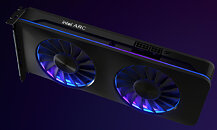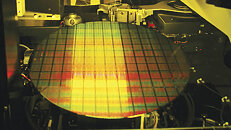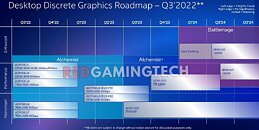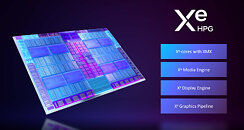T0@st
News Editor
- Joined
- Mar 7, 2023
- Messages
- 2,832 (3.73/day)
- Location
- South East, UK
| System Name | The TPU Typewriter |
|---|---|
| Processor | AMD Ryzen 5 5600 (non-X) |
| Motherboard | GIGABYTE B550M DS3H Micro ATX |
| Cooling | DeepCool AS500 |
| Memory | Kingston Fury Renegade RGB 32 GB (2 x 16 GB) DDR4-3600 CL16 |
| Video Card(s) | PowerColor Radeon RX 7800 XT 16 GB Hellhound OC |
| Storage | Samsung 980 Pro 1 TB M.2-2280 PCIe 4.0 X4 NVME SSD |
| Display(s) | Lenovo Legion Y27q-20 27" QHD IPS monitor |
| Case | GameMax Spark M-ATX (re-badged Jonsbo D30) |
| Audio Device(s) | FiiO K7 Desktop DAC/Amp + Philips Fidelio X3 headphones, or ARTTI T10 Planar IEMs |
| Power Supply | ADATA XPG CORE Reactor 650 W 80+ Gold ATX |
| Mouse | Roccat Kone Pro Air |
| Keyboard | Cooler Master MasterKeys Pro L |
| Software | Windows 10 64-bit Home Edition |
Intel has awarded TSMC with some big contracts for future manufacturing of next generation GPUs, according to Taiwan's Commercial Times. As previously covered on TPU, the second generation Battlemage graphics processing units will get fabricated via a 4 nm process. According to insider sources at both partnering companies, Intel is eyeing a release date in the second half of 2024 for this Xe2-based architecture. The same sources pointed to the third generation Celestial graphics processing units being ready in time for a second half of 2026 launch window. Arc Celestial, which is based on the Xe3 architecture, is set for manufacture in the coming years courtesy of TSMC's N3X (3 nm) process node.
One of the sources claim that Intel is quietly confident about its future prospects in the GPU sector, despite mixed critical and commercial reactions to the first generation line-up of Arc Alchemist discrete graphics cards. The company is said to be anticipating great demand for more potent versions of its graphics products in the future, and internal restructuring efforts have not dulled the will of a core team of engineers. The restructuring process resulted in the original AXG graphics division being divided into two sub-groups - CCG and DCAI. The pioneer of the entire endeavor, Raja Koduri, departed Intel midway through last month, to pursue new opportunities with an AI-focused startup.



The request for a supposedly very large quantity production of next-gen Intel GPUs has surprised industry analysts, especially when remembering the late arrival of the Arc 6 nm-based family of cards, also manufactured under contract by TSMC. Final silicon was ready by the middle of 2022, but further delays resulted in cards not reaching customers until later in the year. Intel looks determined to secure its third pillar in a market segment long dominated by NVIDIA and AMD, and reports of the bulk orders at TSMC seem to confirm that ambition, alongside continued improvement of drivers for the current crop of Arc cards. GPU R&D projects are ongoing and want to meet the demand from entertainment consumers (video games) and enterprise (artificial intelligence assisted tasks) alike. In the more immediate future, Intel is expected to launch a refreshed "Alchemist+" range of graphics cards. Insiders are pointing to a late 2023 launch for the Arc refresh.




View at TechPowerUp Main Site | Source
One of the sources claim that Intel is quietly confident about its future prospects in the GPU sector, despite mixed critical and commercial reactions to the first generation line-up of Arc Alchemist discrete graphics cards. The company is said to be anticipating great demand for more potent versions of its graphics products in the future, and internal restructuring efforts have not dulled the will of a core team of engineers. The restructuring process resulted in the original AXG graphics division being divided into two sub-groups - CCG and DCAI. The pioneer of the entire endeavor, Raja Koduri, departed Intel midway through last month, to pursue new opportunities with an AI-focused startup.



The request for a supposedly very large quantity production of next-gen Intel GPUs has surprised industry analysts, especially when remembering the late arrival of the Arc 6 nm-based family of cards, also manufactured under contract by TSMC. Final silicon was ready by the middle of 2022, but further delays resulted in cards not reaching customers until later in the year. Intel looks determined to secure its third pillar in a market segment long dominated by NVIDIA and AMD, and reports of the bulk orders at TSMC seem to confirm that ambition, alongside continued improvement of drivers for the current crop of Arc cards. GPU R&D projects are ongoing and want to meet the demand from entertainment consumers (video games) and enterprise (artificial intelligence assisted tasks) alike. In the more immediate future, Intel is expected to launch a refreshed "Alchemist+" range of graphics cards. Insiders are pointing to a late 2023 launch for the Arc refresh.




View at TechPowerUp Main Site | Source



